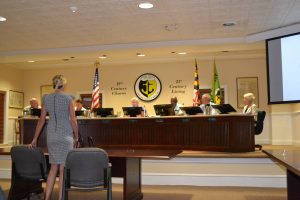
BERLIN – Efforts to help veterans, developing public-private partnerships and assigning Berlin its own prosecutor highlight plans shared by the county’s incoming state’s attorney this week.
Kristin Heiser, who was chosen by voters in June to take over the Worcester County State’s Attorney’s Office, shared her plans with elected officials in Berlin at a council meeting on Monday. Heiser will be sworn in as state’s attorney in early January.
“I would appreciate any thoughts or ideas or any concerns you have relative to what Berlin needs versus the rest of the county and how the state’s attorney’s office can be more proactive and prepared,” Heiser said.
Heiser told the council that while she had lots of ideas, she wanted to highlight a trio of initiatives that were in the works. The first of those, she said, was a veterans court program based in Cambridge. She said Worcester County would be just a handful of jurisdictions taking part in the new program, which aims to connect veterans to the resources they need.
“Of all the people the court system interacts with and provides services for I think obviously they should be our first priority, having given so much for our country and for our county,” she said. “That’s something I’m very excited about.”
When asked by Councilman Zack Tyndall if there were resources locally that would help, Heiser said there were.
“They will assist with not only federal but state and local resources and they have a coordinator who handles things for every single veteran that’s in the program and it’s very specific to each individual veteran…,” Heiser said. “We’re getting in on the ground floor which will mean we have a great opportunity to tell them what exactly our Worcester County veterans need. They’ll tailor the program as it goes along.”
Heiser said that as state’s attorney, she also wanted to encourage partnerships between public and private entities. She said she’d met with several local nonprofits in recent weeks, including Worcester Youth and Family Counseling Services (WYFCS).
“They have a wonderful grant coming up from Governor Hogan and the state which is geared toward 16- to 24-year-olds who are unemployed and not in school,” she said.
When WYFCS leaders said they weren’t yet sure how to find those individuals, Heiser said she could help.
“I have them as a captive audience in the courtroom for anywhere from three to four hours several times a month,” she said, adding that WYFCS, like the other nonprofits she’d reached out to, was willing to work in concert with the state’s attorney. “They’ve all been very open to the idea of working more closely with the state’s attorney’s office to not only identify the people who need assistance but also to work toward helping not only just the juvenile or the first-time adult defender but also their families…That will be a great help in our fight against the opioid crisis.”
Heiser told the council that once she took over the state’s attorney role the first Monday in January, she would be assigning Berlin its own prosecutor. She said she wanted the prosecutor to be someone Berlin citizens knew and could contact when needed.
“Berlin will have a special prosecutor,” she said. “The Berlin Police Department will have a specially assigned prosecutor as well so we can ensure consistency with how we handle problems that are more specific to your town versus other communities that require very different services.”
Heiser encouraged officials to contact her with any other suggestions or concerns.
“Thank you very much for coming,” Mayor Gee Williams said. “I think that says volumes about not only your enthusiasm but the vision you have for this very important part of our law enforcement endeavors here in Worcester County.”
Williams said he was pleased to see Heiser promoting partnerships with nonprofits and praised the concept of a Berlin prosecutor.
“I’m also encouraged by the fact that you’re customizing, and localizing, services based on the needs of the community,” he said.
He said that several years ago, when Joel Todd was state’s attorney, the town partnered with the state’s attorney’s office on a multi-year effort that helped cut down on open-air drug dealing. Heiser said she’d worked in the office at that time.
“We can continue on with that,” she said. “My thoughts are, dealers should be incarcerated, addicts should be in treatment. I’ve never seen it work any other way.”

